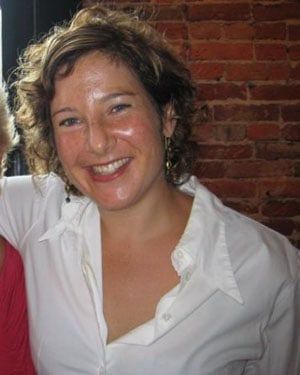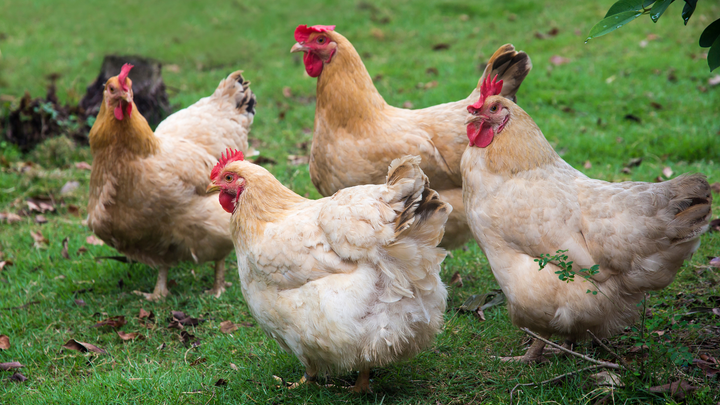Interview with Ana Joanes, Director of FRESH: The Movie
A couple of weeks ago I had the tremendous pleasure of seeing a new documentary called FRESH, a brilliant new movie.
A couple of weeks ago I had the tremendous pleasure of seeing a new documentary called FRESH, a brilliant new movie. It explores the growing number of people involved in sustainable farming and food production who are taking back our food supply from chemical companies and multinational corporations that are destroying our planet and making us sick.

Check out the trailer below (I get teary-eyed every time I watch it):
What follows is my interview with the director, Ana Joanes. Please check my blog in the next couple of days for my glowing review of the movie, along with more clips and information on screenings.
First, here’s a synopsis of the film:
FRESH celebrates the farmers, thinkers and business people across America who are re-inventing our food system. Among several main characters, FRESH features urban farmer and activist, Will Allen, the recipient of MacArthur’s 2008 Genius Award; sustainable farmer and entrepreneur, Joel Salatin, made famous by Michael Pollan’s book, The Omnivore’s Dilemma; and supermarket owner, David Ball, challenging our Wal-Mart dominated economy.
And here’s Ana’s bio:
Ana Joanes was born in Portugal and grew up in Switzerland. Following a travel-abroad program exploring the impact of globalization on the environment and culture, Ana came to the U.S. to study. Upon completion of a B.A. in political science from Barnard college, Ana graduated from Columbia Law School, where she was awarded as a Stone Scholar and Human Rights Fellow. Before dedicating herself to filmmaking, Ana founded Reel Youth, Inc., a video production program for youth coming out of detention, and other under-served youth. Her first documentary, GENERATION MEDS, explored our fears and misgivings about mental illness and medication. FRESH, Ana’s second documentary, celebrates the farmers, thinkers and business people across America who are re-inventing our food system.
Interview with Filmmaker Ana Joanes, Director of FRESH: The Movie
What inspired you to make this movie?
In a media-saturated world, where stories of doom and gloom seem to dominate, I have often felt like a powerless and hopeless observer, watching the world spiraling towards its inevitable destruction. And helplessness would translate into inaction. “What’s the point of switching light bulbs when a million Chinese will soon own cars,” I’d argue internally trying to quell my guilt.
Who knew that we already had the solutions to so many of our problems and that some of us were already hard at work implementing them?
I embarked on the making of FRESH to recapture a sense of agency, a belief that my individual actions do in fact matter. Initially, I intended to document the urgency of the global warming crisis, hoping to scare others and myself into action. Instead, I encountered the most inspiring people, ideas, and initiatives. Who knew that we already had the solutions to so many of our problems and that some of us were already hard at work implementing them? Instead of the despair and inaction unwittingly fostered by the media, these examples of change suggest a very different perspective, that life is an indivisible network in which every node is critical, that each one of us is creating the world we are living in, and that the process of creating it is what gives us meaning and pleasure.
It is precisely the transformation from inaction to agency, the transformation I went through making the film, that I want the film to offer to audiences. And thus, FRESH showcases real people first and foremost, connecting audiences not with facts and figures or apocalyptic policy analysis, but with personal stories of change. Rather than waiting for “the solution” to present itself from some all-knowing expert, FRESH offers audiences a choice and vision for many different possible solutions, all within their own reach.
A sense of agency comes, I think, from audiences feeling empowered to draw their own conclusions and make their own connections. This is a big part of why the film has no narrator, no single “authority figure” voice. The characters themselves suggest links between their experiences and efforts, but it is the audience who I ask to fill that critical role of completing those links, making them concrete and actionable.
More broadly, I hope this film can offer audiences a vision for a more inclusive politics and culture in America. The film’s characters are ethnically, politically, economically, and culturally very different, and yet they’re all connected by a shared vision of a better future. Its my hope that audiences will be inspired to explore and connect outside their traditional comfort zones, to push past difference and forge commonality.
Artistically, I see this film as part of a broadening of environmental media, which has been dominated by either a scientifically didactic, or down-and-dirty “activist” approach, where humanity and artistry are second to urgency. FRESH reflects a more nuanced, sophisticated style that allows for personal connection and narrative pleasure. In the long run, I feel, we connect to an issue most strongly if it is embedded in a good story.
How long did it take you to make the film?
I started thinking about it over three years ago. I spent most of the winter 2005/2006 (early spring) researching and started shooting in April 2006. I shot over 150 hours of footage that first summer. Then I edited through April 2007, while continuing my research and developing the story. I went back to shoot during the Spring and Summer of 2007 and got another 150 hours or so of footage. Then, back to the editing station. I finally hired a full time editor in march or April 2008 and we completed the movie by the end of 2008.
How did you find the farmers and other people you interviewed? How did you choose them?
I interviewed many more farmers than the ones that ended up on the movie. I found some of them in books like Michael Pollan’s The Omnivore’s Dilemma (Joel Salatin and George Naylor were both found in his book), while others came out of newspaper articles or Internet searches (Russ Kremer’s story was written about in a newspaper). I also reached out to many people within the sustainable food movement (professors and activists) and asked for recommendations. That’s how I found Diane Endicott and David Balls and most of the farmers in the midwest. Everywhere I would go, people would tell me to check out this or that person’s farm or initiative… so it was more about sorting out what I still needed to cover.
As far as who made the cut, my choices were based on a mixture of looking for story/personality, and finding people that could address the issues I wanted to cover, including: What’s wrong with industrial agriculture? What is sustainable agriculture? How can ALL people get access to it (is it just for rich people?)? And what are the challenges and opportunities in distributing/marketing sustainable products?
How did you get the footage of the factory farms and the interview with the industrial chicken farmers?
The chicken farmer (Mr. Fox) is the father of the cameraman who I hired to shoot the first time around. It would have been really hard otherwise to get access. The rest of the industrial footage is “archival”.
Do you see a movement happening in America? Do you think change is possible?
“Hope is like a road in the country; there was never a road, but when many people walk on it, the road comes into existence.”
Yes, there’s most definitely a movement happening in America and worldwide. Change is always possible, even when it seems hard to imagine. An alternative to the industrial model is still minuscule but it is the fastest growing market in the U.S. and it’s incredibly energetic. We can’t know when or how we will reach a tipping point and how it will manifest. It’s good to remember that even the most dramatic societal changes (industrialization) did not happen overnight, but they completely transformed, not only our “mode of production”, but how we think, how we relate to each other. I believe that such a dramatic shift in our paradigm might have already started. Whether it will prevails and where it will lead us, I don’t think we can know. I like to remind myself that both cynicism and optimism are equally righteous. We don’t know what the future holds. But hopefulness, on the other hand, is simply the knowledge that change is possible and that we can participate in it. Lin Yutang said that “Hope is like a road in the country; there was never a road, but when many people walk on it, the road comes into existence.”
What can one person do to start making a difference?
There’s many many ways we can affect change: In our homes — by becoming conscious consumers. In our communities, by becoming involved in a garden, by simply sharing our thoughts with our friends. And of course by participating in the work of democracy: in a school board, a community board, joining the work of advocacy groups locally and nationally.
We can’t do it all, and it’s not the point, the point is to find the places where we WANT to act, where we feel that our contribution is meaningful and where we personally benefit (feel enriched) by our work. I think that making a difference starts with becoming aware of our yearning for change, and then connecting with other people who are already engaged in positive ways in our communities.
If there is not a screening in someone’s area, how can they see the film? Can you give more information about how people will be able to watch online (and when that will be available) and how they can get DVDs if they don’t have high-speed internet?
We are working on creating a community on our site so that people can find community screenings in their area and/or organize their own home and community screenings.
DVDs will soon be for sale as well and we might have the movie available for streaming as well. It’s all in the works!



Comments ()